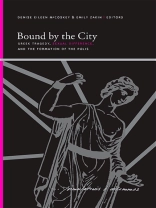This collection offers a vibrant exploration of the bonds between sexual difference and political structure in Greek tragedy. In looking at how the acts of violence and tortured kinship relations are depicted in the work of all three major Greek tragic playwrights—Aeschylus, Sophocles, and Euripides—the contributors shed light on the workings and failings of the Greek polis, and explore the means by which sexual difference and the city take shape in relation to each other. The volume complements and expands the efforts of current feminist interpretations of Antigone and the Oresteia by considering the meanings of tragedy for ancient Athenian audiences while also unveiling the reverberations of Greek tragedy’s formulations and dilemmas in modern political life and for contemporary political philosophy.
Innehållsförteckning
Acknowledgments
Introduction
Denise Eileen Mc Coskey and Emily Zakin
1. City Farewell!:
Genos, Polis, and Gender in Aeschylus’
Seven Against Thebes and Euripides’
Phoenician Women
Peter Burian
2. Antigone: The Work of Literature and the History of Subjectivity
Charles Shepherdson
3. The Laius Complex
Mark Buchan
4. Jocasta’s Eye and Freud’s Uncanny
David Schur
5. Sexual Difference and the Aporia of Justice in Sophocles’
Antigone
Victoria Wohl
6. Tragedy, Natural Law, and Sexual Difference in Hegel
Elaine P. Miller
7. Marrying the City: Intimate Strangers and the Fury of Democracy
Emily Zakin
8. Playing the Cassandra: Prophecies of the Feminine in the
Polis and Beyond
Pascale-Anne Brault
9. The Loss of Abandonment in Sophocles’
Electra
Denise Eileen Mc Coskey
10. Electra in Exile
Kirk Ormand
11. Orestes and the In-laws
Mark Griffith
List of Contributors
Index
Om författaren
At Miami University,
Denise Eileen Mc Coskey is Associate Professor of Classics and Affiliate Black World Studies, and
Emily Zakin is Associate Professor of Philosophy. Zakin is the coeditor (with Ellen K. Feder and Mary C. Rawlinson) of
Derrida and Feminism: Recasting the Question of Woman.












